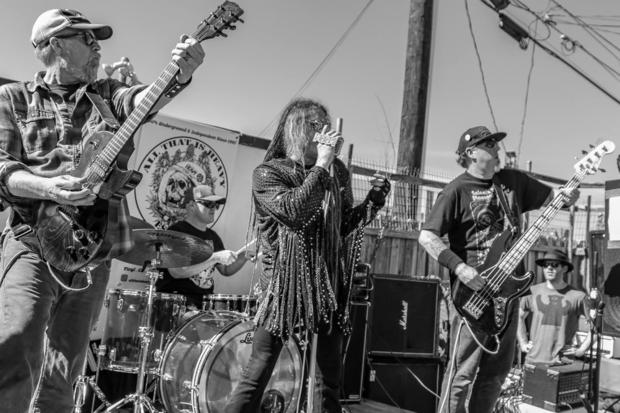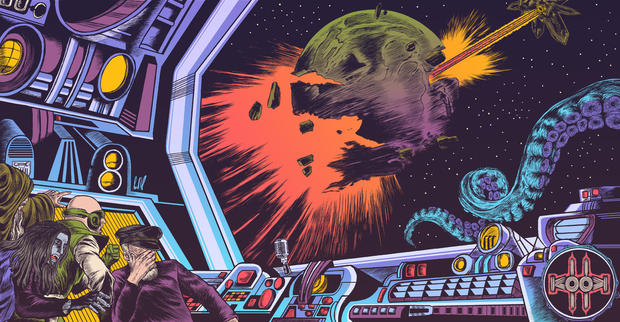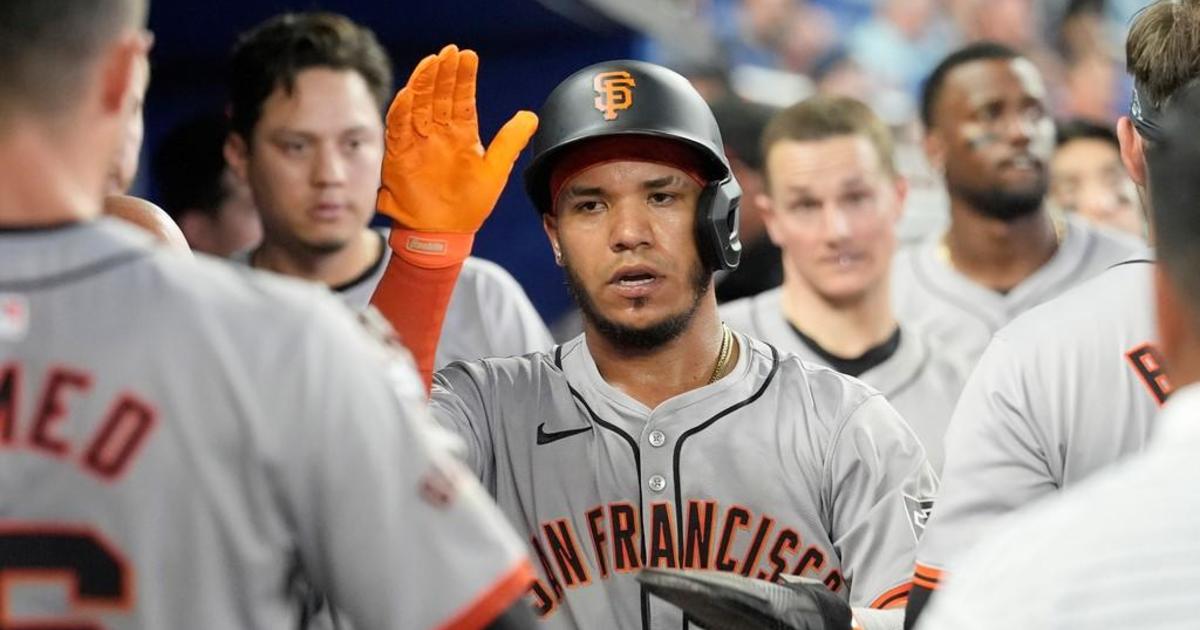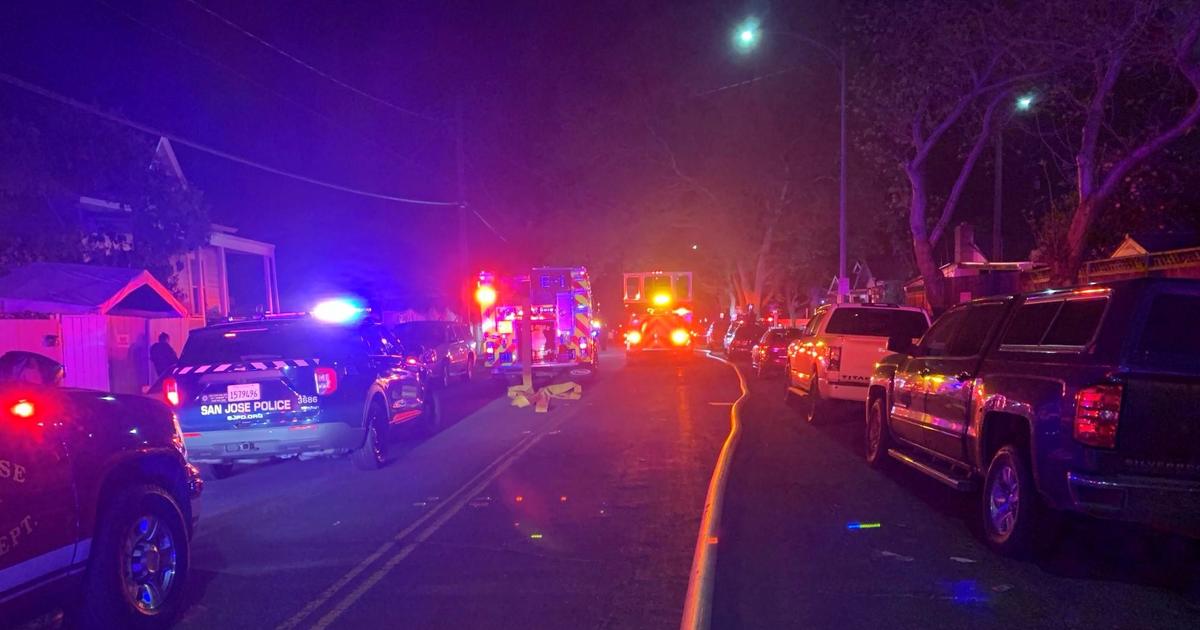CBS SF Talks To Kook Bassist Jeff Wilson
By Dave Pehling
SAN FRANCISCO (CBS SF) -- In the short space of four years, San Jose heavy rock outfit Kook has risen to become one of the most interesting doom crews to emerge from the South Bay city this side of Sleep. Founded by veteran guitarist Karl Larson (who was an early member of Sleep guitarist Matt Pike's band High On Fire before they decided to strip down to a trio) and original drummer Mike Donofrio in 2015, Kook would eventually be filled out by bassist Jeff Wilson and singer Troy Aschenbrenner.
Crafting a wildly diverse sound that -- while rooted in 'the classic blues-tinged template of 70s heavy rock -- drew freely everything from '60s psychedelia to '90s alternative rock and grunge to modern doom, Kook would emerge with the group's debut album I in 2017. The opening chapter of what the band has outlined as a sprawling, conceptual sci-fi trilogy about the destruction of Earth, the recording announced Kook as a unique new voice in the Bay Area. Playing a steady string of gigs locally along with occasional regional tours through different parts of the U.S., Kook would pick up a new drummer in Eric Wilkins (of industrial-metal outfit Klank) while building on its reputation for cathartic, crushingly heavy live performances.
For the band's latest effort, the appropriately entitled second album II, Kook makes a quantum leap forward in refining the band's idiosyncratic approach to creating sprawling doom epics (the songs mostly clock in at seven minutes or longer) that unfurl the second installment of their apocalyptic space saga. CBS SF recently spoke with bassist Jeff Wilson about the band's origins and the concepts and inspirations behind Kook's unusual musical chemistry ahead of their record release party on Friday, May 17, at the Homestead Bowl & the X Bar in Cupertino with like-minded Portland, OR-based group Ape Machine, SF headbangers Disastroid and opening band Sky Pig.
CBS SF: I think you've talked to me about how Kook first came together a little bit. I didn't know about Karl's history with High on Fire or the other bands he was in. Did it start with you and Karl? I know everybody in the band has had other previous experience...
Jeff Wilson: So Karl, in the mid-1980s, was in a bands called Sin City that turned into Motorfly. They kind of rode that late hair-metal wave to kind of the pre-grunge wave. So they were playing showcases in LA and being about as big as you can get without breaking, and then f--king up their record deal. I don't know, that's their story, not mine. There's a legendary story about the Cactus Club the day after the Bang Tango video for "Someone Like You" was first played on MTV. And they [Motorfly] were opening that show and arrived to find this line around the block to see this band that, the night before, no one had ever heard of. So it was in that weird late '80s period of the Bay Area's evolution.
He had that one crack at it when he was really young and he got disillusioned with the style they were playing. Karl moved away and got in this really cool band in Seattle called Imperial Space Pod. They made a record with Jack Endino that never came out. I think I sent that to you...
CBS SF: Yeah, I like it! I haven't listened to it as much as the new Kook, but I like it...
So years later, we all practiced at the same place in San Jose called the Rock Garden. A bunch of bands that ended up on Man's Ruin like Operator Generator. Karl was good friends with the Rice brothers and [original High on Fire bassist] George Rice was playing with Matt Pike after Sleep fell apart, and they started jamming. I think the one picture he has is a picture from the day Des [Kensel, longtime High on Fire drummer] auditioned for the band. So I think it just quickly became pretty clear that it was Matt's band and it was a band with one guitar. It wasn't a problem or a big deal.
Jeff Wilson: Karl kind of moved in and out of the Bay Area. Troy spent about 15 years fronting a pretty prominent goth band called Kill Sister Kill. They were another case of a pretty successful local band. Eric played drums in Klank, which is a fairly well-known industrial-metal band. And then I played in bands on and off. I played in a band with Pete Koff, who is the little brother of Rory Koff, the drummer from No Use For a Name. We played at their house; that's where our high school punk band practiced. And then I took some time off.
So Larry, who was the other guitarist in Motorfly, he and I met 25 years ago as coworkers. We've known each other forever. We actually played in a band in the late '90s and early 2000s with this guy Greg Meredith, who now fronts Grimace and the Fakers, this kind of blues-punk Jon Spencer type band. Anyway, I had met Karl a bunch of times, but we'd never talked about being in a band together for some reason. I don't know why.
Grimace hit me up sometime around September of 2015 and said "Hey, Karl is looking for somebody to play bass. You should go check it out. I think you could hit it off." Larry had told me Karl could be a tricky person to be in a band with, because he has a really creative mind and doesn't really play guitar like anybody else. So he can be tough to follow. And it's totally true, but as it turned out, he was like a perfect match for me. And actually the first time I went to play with them, it was the same night that Troy went and played with them for the first time as singer.
After we played that first practice, it seemed weird. It was kind of like the Cramps or Elvis singing in a doom band. We couldn't get a handle on exactly what it was, but we all thought it was interesting and cool enough to move forward and try being a band. That was with our first drummer, Mike Donofrio.
So we plugged away and recorded our first record at Expressions College in Emeryville. Chris Hughes, who engineered the first record and then worked with Billy on the second record, he was an instructor at Expression College. We were able to use the studio there during the weekend, since as an instructor he had access. So we did it kind of on the cheap and it's all live takes with some minimal overdubs. Troy went in and did the vocals separately, but the primary bass and guitar and drums were all a single live take. After that, we did a short tour and ended up switching drummers. Then we hunkered down to write this new record.
Eric is a really musical drummer. Karl and I had all this stuff that we wanted to write, but was a bit complex with tricky rhythms and weird time signatures. Stuff that was kind of hard for us to do initially, but Eric was right on board. We just started cooking up these weird songs. They typically start with Karl having a series of riffs and we sort of cycle through them and start connecting the pieces and putting the songs together while Troy kind of sits in the background, humming melodies over what we're doing.
When we walked into the studio with those songs dialed. We didn't do full live takes like we did with the first album. We weren't in the room together, but the truth is, most of what's on II is fairly live takes. It's one good take with some overdubbing and a couple of added bits here and there. Because we have the songs so rehearsed by the time we went in to record. I've never been in a band where we wrote in the studio. I feel like that's a luxury you have if you own a studio or you're giving me lots of money [to record], but when you're funding recording yourself or have a small label behind you, writing songs in the studio is not that efficient.
So we just went into Sharkebite Studios in Oakland to record. A lot of great records have been recorded there. Billy spent like 15 years there. We were on a tour in the Pacific Northwest and I've been following Billy's work since I was a teenager. I'm a huge Mr. Bungle fan. The guy who recorded Disco Volante and California is definitely someone I want to work with at some point in my life.
CBS SF: I know he was one of the main people recording a lot of the Man's Ruin stuff in the '90s...
Jeff Wilson: He did that, he did Sleep's Dopesmoker, he did tons of Melvins records. He actually played in the Melvins for a while. He came to a show we played in Portland and after we were done, he said, "Hey man, I really liked that. I'd love to record you guys some day."
CBS SF: This album feels like a major leap forward in terms of the band sound from your debut, which you already alluded to. Did your process change between the first and second record?
Jeff Wilson: It was everything. We had more time together. We really had time to jell with Eric. He was up the stuff that we wanted to write and those songs had more time to bake. The songs on the first record were songs that Karl and Mike had already figured out. The compositions were complete, and I came in and wrote bass parts and we made some little changes here and there and Troy came in and wrote vocals. We just wanted to get something down because then we could get shows and it just makes everything easier. The second record was the first time we all sat together with the intention to write songs.
CBS SF: What is the band's process writing as unit? Is everyone bringing in their individual ideas into the writing room that you figure out how to fit it all together?
Jeff Wilson: Typically, it starts like that. Most of the songs center around two or three riffs that Karl sort of has chained together. So we cycle that, we get it down and then we explode it. We put things in between, we flip the order around, we add parts here and there that weren't there before. And there's some conceptual work too. We're already working on the third record. There are musical echoes, there is music that's in the first record that's in the second record too -- chord progressions and melodies. And there's already music in the second record that will be echoed in the third record. And some from the first two.
That's intentional, because we're kind of telling the story of this one moment in time in the universe and how it echoes. The same singular moment can be used to tell all kinds of different stories. It's so hard when you've got to write something to just go in with no ideas and just go, "Here's the guitar part!" Not having a framework, I kind of have a hard time knowing where to go from there.
But when I have a story in my head, it makes it easier to make some of the decisions about what should go where and what should come next. We're writing hard stuff. It's hard to play and hard to figure out, so it's good to have something to guide you. And the narrative has provided that.
CBS SF: Does Troy write most of the lyrics himself, or is that kind of a collaborative thing too? Or maybe he comes up with the main lyric and you guys contribute or make suggestions?
Jeff Wilson: All the melodies are Troy and, especially on II, he wrote a lot of the lyrics. But we do work on stuff together. We help fill in gaps or places where he's stuck and doesn't know what to say. Or we just make suggestions. So far, there has been one song on each record, "Play Dead" on the first record and "Chains" on the second, that Karl wrote most of the lyrics for.
But everyone gets equal writing credit for everything. We split it that way because we think that's just the way it is. But there's a story that Karl's telling that, if you listen to those, it's more personal and less cosmic. The songs are shorter and tighter and structurally they're a little different. But Troy does the bulk of it.
CBS SF: I was thinking that the songs have an interstellar/cosmic bent, but it also seems to sometimes touch on some inner turmoil rather than outer space journey. Do you have a preferred interpretation? Or do you think it should operate on both levels?
Jeff Wilson: I chalk it up to the fact that we're all roughly the same age, right? Mid-40s to mid-50s. I remember sitting down to watch "The Day After" -- that nuclear holocaust show that for some reason everyone let their kid watch, even though it was on a school night? That perpetual terror of a world on the brink, something that I think is pretty palpable these days. The trauma of that threat to the world and to the individual mixed with the idea that the kooks, the weirdos who live on the fringe, see it coming.
I'm always fascinated when you go back and listen to a bunch of Charles Manson's ramblings, like 40 percent of it is dead on. The rest is completely insane. Or go back and listen to [Heaven's Gate cult leader] Marshall Applewhite's ramblings about the aliens and the comet. A lot of it is bats--t crazy, but some of it is right. So the conceit is like, what if he or what if they were right? And this all does go the way they think it's going to go?
In the second record, they did their thing and they got on their ship and got off the planet and they watched the planet explode. And then had to wrestle with all the feelings that come after that moment. Here are the last four people who witnessed this thing happen and tried to tell everyone, but they wouldn't listen and they escaped and no one else did. What are they feeling? There's some elation and some relief and grief and a bunch of confusion about what comes next. That's the moment of the second record.
The third record, the way the songs are coming together so far, it's more like a mix of characters. Every song is "The Something;" "The Redeemer," The Gifter." It's about a different personalities and beings they meet in space as they explore the galaxy. It's going to have a different feel. It's going to tell in shorter, more concise stories about individuals. It's going to be a little more conventional. Right now, we have a song that's three and a half minutes long, which is unfathomable.
CBS SF: That is surprising, considering the epic nature of most of the songs on II...
Jeff Wilson: Karl and I are both completely unabashed lovers of Rush. The whole reason I play bass is because I went and bought 2112 and went, "Holy cow. They make music like this? This is all I want to listen to for the rest of my life!" And Alex Lifeson is probably Karl's favorite guitar player ever. He's not a lot of people's favorite guitar player -- I think he's amazing -- but he's not for everybody. And from there, I got into all that weird s--t that was happening in the Bay Area during the late '80s and early '90s, like Primus and Mr. Bungle. So that's kind of baked into my being. This writing and trying to grapple with playing a two and a half minute long song.
CBS SF: I did want to talk about about the album art. How did you end up working with @alfiandikid? It's one thing looking at images on a computer, but actually getting the record and seeing the layout on a gatefold sleeve, the artwork is really spectacular...
Jeff Wilson: Originally, we were going to have Adam Burke, who made our first album cover, do another painting. I love Adam and would have him paint everything that we ever do. But the kid reached out to us. He's a college student and he'd done work for a bunch of bands. He'd done art for Beer Wolf and Sacha Dunable for Intronaut. He's a popular artist for doom and stoner rock. And I looked through his work and just loved the crazy colors which gives a strong psychedelic feel to what he does.
I like that it's so colorful and looks like comic book art. When you're in the record store flipping through metal records, there are so many black records with an indecipherable logo and a bunch of skulls and stuff. We were talking during practice one night about concepts. We knew we wanted to do the same cover as the first album exactly, but from an alternate perspective. So rather than have Adam do the same painting he'd already done from a different angle, we thought, "What if we change the style of the art?" And in this case, we intentionally went with a psychedelic comic book look. And I'd already worked with him from when he made the Beers in Hell poster; he was great. A super nice guy.
So I have a book of Ralph McQuarrie concept art from Star Wars, two giant volumes. And there are these really neat drawings he did of Luke and Leia standing in front of a big window looking out into space from inside a ship. And we thought it would be interesting to get the moment of impact from the same perspective of these four travelers who are in this ship watching what's going on from the safety of a spaceship. And the spaceship is in Adam's painting [for the first album]. It's really tiny, but it's there. You might not notice it if you don't zoom in and look at the cover. I have the original painting up in my house, so I look at it all the time.
I was also going to ask about a couple of possible Star Wars references in this album cover. There's the one character with the guitar who looks a little like Ben Kenobi. But there's also the guy who looks like Lando Calrissian's right hand man in The Empire Strikes Back, the guy with the headset. He looks like one of the characters too. Are these Easter eggs you're putting in the art?
Jeff Wilson: I sent a bunch of reference art and we talked about a bunch of stuff. That guy who looks like Lobot also looks a little bit like Geordi La Forge [LaVar Burton's character from Star Trek: The Next Generation]. Which is a nod to the fact that our drummer Eric is legally blind. So each one of us gets a cool character. Troy is the cool space vampire, Karl has to be the wizard and I get to be the captain, which is a not very subtle take on a Picard meme, just because why not [laughs]? If we're going to go to all that work to reference all that different sci fi, why not pull in something a little silly and of the times.
CBS SF: "Left Behind" kind of has echoes of what I think of as almost the first heavy doom tune, "I Want You (She's So Heavy)" by the Beatles. I was wondering if that was something that was conscious?
Jeff Wilson: Interesting. I haven't heard anyone say that, but I know Karl loves the Beatles. I mean, "Left Behind" is just a straight blues progression. It's got a couple more chords than a typical blues progression. But the challenge with that song, and I think this a pretty common question in heavy metal and heavy music in general, is how hard is it okay to lean on the blues? Can we keep remaking that song over and over again? The public seems to have an insatiable appetite for it, because we sell the Black Keys at Starbucks.
We know all those songs already. And it's the same form the Beatles were pulling from. Can you take that form and make it sound new? There's the tension of, "Is it okay to play pentatonic? Do we have to go to weird scales and modes all the time?" We're total dorks [laughs]. And it's really involved. But something about that progression really felt right. There was something about getting it so heavy and so loud. I love playing that song. We've been playing that song forever. "Left Behind" and "Chains" are two of the first songs we wrote. We've been playing them for a really long time, but I still love playing them.
"Left Behind" in particular. I can see people getting bored with it. You get a pass from me. It is a long song and it's slow and quiet at parts. But it's such an emotional roller coaster. So there's no specific Beatles reference, but I'll have to go back and listen to it. I'm hearing all kinds of weird stuff and people keep referencing different things. That's sort of been a difficulty for us, just trying to explain the band.
But I guess that's the whole idea of this. We're old and weird and tired of trying to do stuff to please anyone but ourselves. So f--k it! We'll just make the songs that we like. If we play a show to 50 people and there's one guy who's like "Whoa! That was amazing!" that's who I'm playing for. And that's enough.
Kook play their record release party with Ape Machine, Disastroid and Sky Pig at the Homestead Bowl & the X Bar in Cupertino on Friday, May 17 at 8 p.m.





